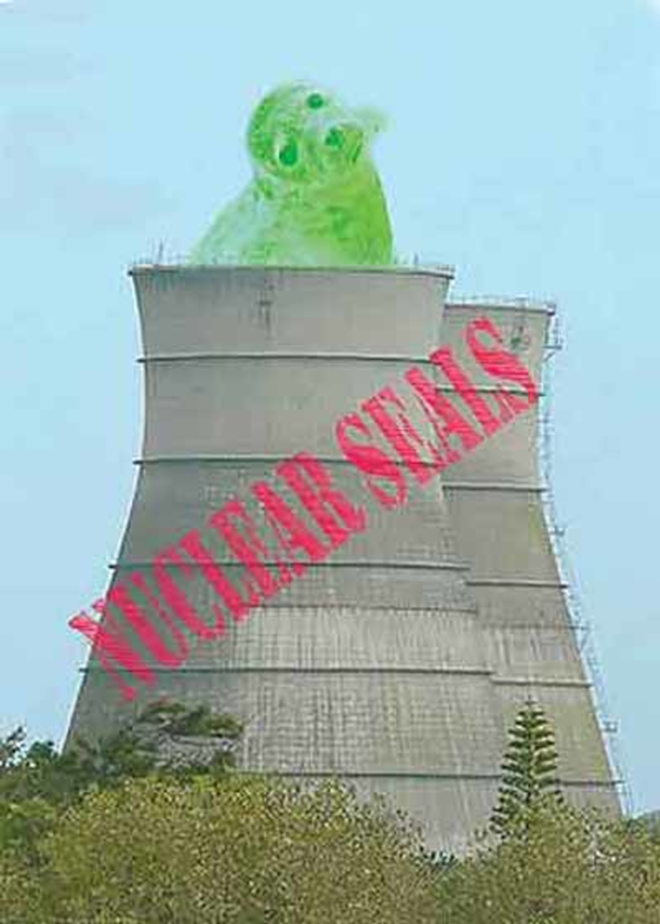Just because John Bolton is crazy doesn't mean he's not correct sometimes.
Bolton is a former Bush State Department diplomat best known for his broom-thick mustache, and, oddly enough, his apparent contempt for the very concept of foreign diplomacy.
He hates the idea of international courts and once said "it wouldn't make a bit of difference" if the United Nations headquarters building in New York lost 10 floors.
In an administration filled with foreign policy hawks, he was among the hawkiest. The only way Bolton could be more hawkish is if he lived in a tree and ate field mice.
Bolton left the administration in 2006 and has since become something of a Bush basher. He thinks the White House has gone soft.
Last spring, he told Fox News that the United States should attack Iran immediately. It would be, he explained, "the most prudent thing to do." And Bolton has been perhaps the loudest public critic of Bush's attempt to negotiate an end to North Korea's nuclear weapons program.
After North Korea's October 2006 test of a nuclear weapon, the U.S. reversed its no-concessions policy with North Korea, offering financial assistance and energy aid. In exchange, North Korea promised to end its nuclear program.
Bolton, who opposes concessions to North Korea, says the last remaining Stalinist regime can't be trusted to honor any nuclear deal. The North Koreans, he said, are "going to be rewriting this agreement every day and that's why it's a fantasy."
Was he right?
Last week, North Korea evicted international nuclear inspectors from its Yongbyon nuclear facility and removed the seals from its nuclear fuel processing equipment. And when I say seals, I don't mean seals in the adorable sea creature sense.
I mean it in the shrink-wrap sense; tamper-proofing materials installed by the International Atomic Energy Agency to ensure that the North Koreans aren't using the equipment while the inspectors are napping.
North Korea says it plans to start up its nuke machines again and make more fuel.
The North Koreans insist they're not doing anything wrong. The U.S., they say, reneged on the deal when it failed to remove North Korea from its list of states that sponsor terrorism as promised. Being on the terrorist list discourages international lending institutions and investors from doing business with North Korea.
The U.S. says North Korea has yet to agree to a verification protocol that would allow the outside world to be sure that it isn't secretly building more nukes. No verification, no terrorist-list-removal.
So what's North Korea doing? No one knows for sure.
North Korea's reliably weird English-language propaganda website offers no clues.
On the day North Korea told international inspectors to leave Yongbyon, the top story was about a conference celebrating North Korea's "scientific and technological achievements in the field of potato farming." The minister of agriculture gave the keynote address, titled "On Immortal feats the great leader Comrade Kim Jong Il performed by setting forth the policy of bringing about a signal turn in potato farming and wisely leading the work to implement it."
Speaking of the immortal feats of Kim Jong-il, rumors abound that he may have recently suffered a stroke. He failed to appear at a Sept. 9 parade marking the 60th anniversary of North Korea's founding — a parade he hadn't missed in 10 years.
It could be that the Dear Leader's underlings are acting boldly to create the illusion that North Korea still has a strong leader. A more likely scenario is that the North Koreans are doing what Bolton said they would — unilaterally changing the terms of the nuclear deal.
Why should they stick with the current deal when more threats might get them even more economic and development aid?
North Korea is unreliable, yes. But a big part of the problem is that Bush refused to really negotiate with North Korea until after it had a nuke. We have much less leverage with them now.
Too bad Bolton didn't understand that back in 2002, when he was instrumental in thwarting potential nuclear deals with North Korea — deals that would have been much more favorable to the U.S. because North Korea probably didn't have a nuke to threaten anyone with.


